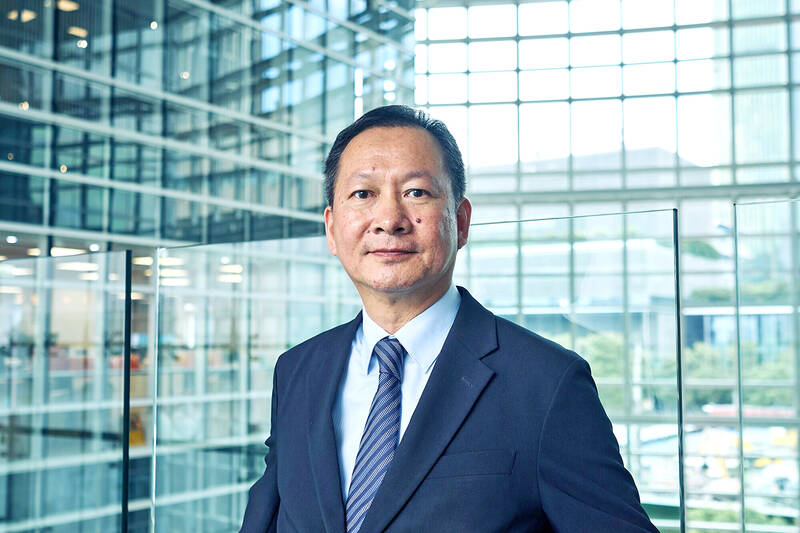Demand for artificial intelligence (AI) chips should spur growth for the semiconductor industry over the next few years, the CEO of a major supplier to Taiwan Semiconductor Manufacturing Co (TSMC, 台積電) said, dismissing concerns that investors had misjudged the pace and extent of spending on AI.
While the global chip market has grown about 8 percent annually over the past 20 years, AI semiconductors should grow at a much higher rate going forward, Scientech Corp (辛耘) chief executive officer Hsu Ming-chi (許明琪) told Bloomberg Television.
“This booming of the AI industry has just begun,” Hsu said. “For the most prominent company, the equipment we sold to them probably increased two to three times in a year.”

Photo: An Rong Xu, Bloomberg
DOUBTS
Hsu’s comments came after Nvidia Corp reported earnings that failed to meet investors’ loftiest expectations. Analysts also issued fresh warnings that AI’s promise of rewiring global economies is thus far unproven.
Nvidia’s shares tumbled 9.5 percent on Tuesday, wiping out US$278.9 billion in the biggest loss of value ever for a US stock. The stock edged 1.7 percent lower on Wednesday after a media report that it received a subpoena from the US Department of Justice, which the company denied.
Still, Hsu said he expected his company would see quarterly sales grow sequentially during the second half of the year, after second-quarter revenue increased 4.61 percent to NT$2.29 billion (US$71.4 million) from NT$2.19 billion the previous quarter.
SCIENTECH OPTIMISTIC
Hsu expressed his confidence in the launch of many AI applications in the future.
Taipei-based Scientech makes equipment used in TSMC’s exclusive packaging technology, called chip-on-wafer-on-substrate. That is in turn employed to make AI chips for the likes of Nvidia. Scientech’s net profit in the first half grew 45.5 percent to NT$436.19 million from a year earlier and its share price has gained 76.4 percent since the beginning of this year.

The Eurovision Song Contest has seen a surge in punter interest at the bookmakers, becoming a major betting event, experts said ahead of last night’s giant glamfest in Basel. “Eurovision has quietly become one of the biggest betting events of the year,” said Tomi Huttunen, senior manager of the Online Computer Finland (OCS) betting and casino platform. Betting sites have long been used to gauge which way voters might be leaning ahead of the world’s biggest televised live music event. However, bookmakers highlight a huge increase in engagement in recent years — and this year in particular. “We’ve already passed 2023’s total activity and

Nvidia Corp CEO Jensen Huang (黃仁勳) today announced that his company has selected "Beitou Shilin" in Taipei for its new Taiwan office, called Nvidia Constellation, putting an end to months of speculation. Industry sources have said that the tech giant has been eyeing the Beitou Shilin Science Park as the site of its new overseas headquarters, and speculated that the new headquarters would be built on two plots of land designated as "T17" and "T18," which span 3.89 hectares in the park. "I think it's time for us to reveal one of the largest products we've ever built," Huang said near the

China yesterday announced anti-dumping duties as high as 74.9 percent on imports of polyoxymethylene (POM) copolymers, a type of engineering plastic, from Taiwan, the US, the EU and Japan. The Chinese Ministry of Commerce’s findings conclude a probe launched in May last year, shortly after the US sharply increased tariffs on Chinese electric vehicles, computer chips and other imports. POM copolymers can partially replace metals such as copper and zinc, and have various applications, including in auto parts, electronics and medical equipment, the Chinese ministry has said. In January, it said initial investigations had determined that dumping was taking place, and implemented preliminary

Intel Corp yesterday reinforced its determination to strengthen its partnerships with Taiwan’s ecosystem partners including original-electronic-manufacturing (OEM) companies such as Hon Hai Precision Industry Co (鴻海精密) and chipmaker United Microelectronics Corp (UMC, 聯電). “Tonight marks a new beginning. We renew our new partnership with Taiwan ecosystem,” Intel new chief executive officer Tan Lip-bu (陳立武) said at a dinner with representatives from the company’s local partners, celebrating the 40th anniversary of the US chip giant’s presence in Taiwan. Tan took the reins at Intel six weeks ago aiming to reform the chipmaker and revive its past glory. This is the first time Tan